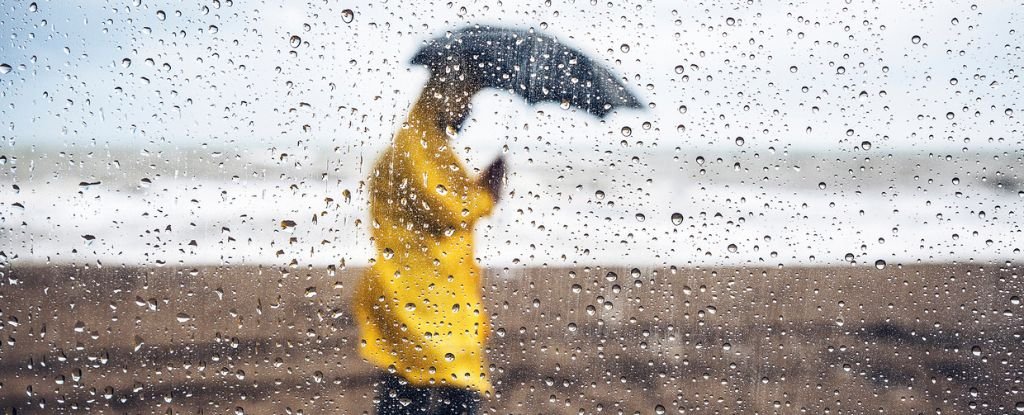Humans are filling the world with trash, but not all of our waste is visible to the human eye.
While plastic litter on the beach is easy to spot, microplastics and 'forever chemicals' have leached far and wide without our barely noticing.
Both forms of pollution are now so ubiquitous in the environment, they are falling with the rain. But while the potential threat of microplastics is a regular point of discussion, some researchers argue the spread of other persistent synthetic compounds is comparatively overlooked.
A team of scientists in Europe are now worried we have crossed a critical line. They argue the presence of forever chemicals in our hydrosphere at values that exceed key guidelines means we have entered an unsafe operating space from which there is practically no return.
The warning comes on the heels of another cautionary paper, which argues the world has breached the safe planetary limit for synthetic chemicals.
Similar to microplastics, the potential health effects of long-lasting per- and polyfluoroalkyl substances (PFAS) are still largely unknown.
While some types of PFAS are linked to potentially hazardous effects, like cancer, rigorous research is lagging behind and government safety thresholds in the United States are largely unenforced.
Researchers in Europe are concerned that if some forever chemicals do turn out to have toxic effects in the future, it will be too late.
A global analysis of PFAS levels over the past ten years has found PFAS levels in rainwater "often greatly exceed" US Environmental Protection Agency (EPA) advisory levels, They also often exceed Denmark guidelines (which, after the US, is the most strict, globally).
The contamination is consistent even in remote areas like the Tibetan Plateau, where researchers found some chemicals exceed EPA guidelines by 14-fold.
"Based on the latest US guidelines for PFOA in drinking water, rainwater everywhere would be judged unsafe to drink," says environmental chemist Ian Cousins from Stockholm University in Sweden.
"Although in the industrial world we don't often drink rainwater, many people around the world expect it to be safe to drink and it supplies many of our drinking water sources."
In Sweden, for instance, a national mapping of PFAS revealed nearly half of municipal drinking waters exceeded safety levels.
Nor is it just water that's impacted. PFAS are also leeching into soils, and this ground contamination regularly exceeds guideline values in Europe.
In fact, industry players in the Netherlands found it so difficult to meet past safety standards, the Dutch government simply relaxed its guidelines.
Meanwhile, in the US, PFAS guidelines are becoming stricter as scientists learn more about what these chemicals do to human health.
Just this year, the US EPA recently lowered its safety threshold for some types of PFAS because they turned out to be more dangerous than regulators thought.
In 2020, the Environmental Working Group, a government watchdog, warned that there were unsafe levels of PFAS in a lot of drinking water in the US.
This group, however, has a history of overstating the health impacts of certain chemicals, and, at the time, EWG's safety levels for PFAS in drinking water were much lower than the EPA's guidelines.
Not anymore. In 2020, the EPA health advisory for two classes of chemical, known as PFOA and PFOS, was 70 parts per trillion. Now, it's far, far lower, specifically 0.004 parts per trillion for PFOA and 0.02 parts per trillion for PFOS.
At these new, barely detectable levels, about half the US population would be exposed to potentially harmful chemicals based on EWG research.
"There has been an astounding decline in guideline values for PFAS in drinking water in the last 20 years," says Cousins.
"The drinking water guideline value for one well-known PFAS substance that is possibly carcinogenic has apparently declined by 37.5 million times in the US."
That's not a good sign. It suggests regulators have been overlooking or underappreciating the risks associated with some types of long-lasting manufactured chemicals, produced by the military and contained in products like Teflon, Scotchguard and foam.
"Irrespective of whether or not one agrees with our conclusion that the planetary boundary for PFAS is exceeded, it is nevertheless highly problematic that everywhere on Earth where humans reside recently proposed health advisories cannot be achieved without large investment in advanced cleanup technology," the authors conclude.
"Indeed, although PFOS and PFOA were phased out by one of the major manufacturers (3M) 20 years ago, it will take decades before levels in land-based water and precipitation approach low picogram per liter levels."
The recent analysis only considered four types of PFAS, which means these results are probably the tip of the iceberg. Hundreds of other persistent chemicals are also leaching into the environment at the same time, and most of their risks are unknown.
Federal regulations are simply not keeping pace with the scale of the problem.
The study was published in Environmental Science & Technology.
- Karlston, Mutton and humble3d
-

 3
3



Recommended Comments
Join the conversation
You can post now and register later. If you have an account, sign in now to post with your account.
Note: Your post will require moderator approval before it will be visible.